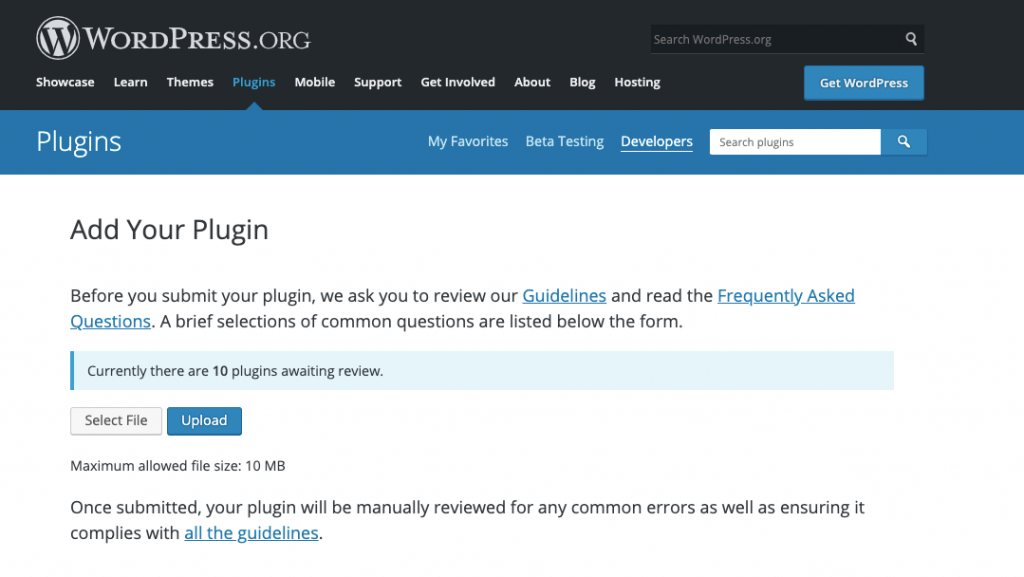
WordPress Plugin Repository- A Guide for Developers
There are over 50,000 plugins on WordPress right now. This vast number of plugins made WordPress a force to reckon with. Now more than 40% of all websites globally are powered by WordPress. A huge amount of developers are working passionately to help millions of WordPress users around the world.
That means demand for newer plugin repositories is also on the up. While WordPress itself has a plugin store with the most comprehensive collection of plugins, there are also some other websites that developers can use to upload their plugins.
Today we will go through the necessities of the WordPress plugin repository, and show you the types of plugin repositories. We will also discuss the process of plugin submission on the WordPress official plugin repository and how you can achieve the best possible ranking for your plugin.
But first, let us talk about what a WordPress plugin repository really is.
What is a WordPress Plugin Repository?

A WordPress plugin repository is a store where a WordPress plugin can be stored and managed. WordPress plugin repositories allow developers to upload and update plugins. This makes it easy for the developers to manage their plugins while also promoting them with ease.
Developers can also offer the plugins on their company website, which saves some money.

However, there are certain advantages of plugin repositories, that make the plugin developers opt for them. Which are those? Let’s get to know!
Why Should You Use a WordPress Plugin Repository?

As a developer, you can offer your plugins on your company website. But why exactly use a repository to do the same thing? Here are some key reasons-
- Larger Audience: Renowned plugin repositories has a large market share. This makes it easier for developers to find a bigger audience right from the time they first launch the plugin.
- Less Marketing Cost: The marketing cost for branding and promoting a plugin is high. Using WordPress plugin repository helps plugin developers to reach targeted audience with a little amount of money.
- Compete Against the Counterparts: As WordPress plugin repositories contain a lot of plugins, developers can take notes from the competitors and upgrade their features to stay in the competiton.
- To Get Known: Plugin repositories can give a plugin the initial exposure that they need to get known to the users.
- Easy to Manage: As the plugin repositories manage all the hassle of storage and update process, you can just work on the features and rely on the repositories for marketing end.
There are other benefits like plugin SEO and comparatively more profit opportunities (for less popular plugins) that attract developers in uploading their plugins on a WordPress plugin repository.
Types of WordPress Plugin Repository

When we say the word “WordPress Plugin Repository”, we don’t actually focus only on the official WordPress repositories, but anywhere that developers can store their plugin and offer to the users. There are two types of WordPress plugin repositories. And they are divided by none other than the monetization opportunity.
- Free WordPress Plugin Repositories
- Premium WordPress Plugin Repositories
Let us show you some examples of both types.
Free WordPress Plugin Repositories

Free WordPress plugin repositories are those that allow users to download and get information about a plugin. There are two notable WordPress repositories that we want to share with you as a plugin developer.
1. Official WordPress Plugin Repository (WordPress.org)
WordPress.org is the king of plugin repositories when it comes to finding the largest collection of plugins in one place. The majority of the plugin developers of the WordPress community upload their plugin on WordPress.org, the official and most popular WordPress website that you can find.
2. WP Hive (and other 3rd party repositories)
WP Hive is a free WordPress plugin repository that provides users with a lot of advanced information about a plugin. This includes a plugin analytics feature, which shows important insights like memory usage, page speed impact, or any errors that the plugin might have. WP Hive also allows a user to compare between multiple plugins.
The great thing about WP Hive is that you don’t have to upload your plugin to the WP Hive repository, as it presents the data straight from WordPress.org.
WP Hive also has a collection of great WordPress resources where they review plugins, themes, and share everything you need to know about WordPress.
You might also find other free repositories like Plugin for that, Download Free WP Plugins, WP Socket useful.
Premium WordPress Plugin Repositories

The free plugin repositories let developers offer their plugins to the customers for no cost. However, in order to earn money from the plugins developers also either upload a premium version of the plugin on their personal website or a premium WordPress plugin repositories. Here are some premium plugin repositories that a plugin developer must know about.
1. CodeCanyon
CodeCanyon is from Envato, which is one of the biggest marketplaces for digital assets of all kinds. It is also home to some of the best WordPress plugins, partly due to the fact that developers can upload their plugin on this website and forget about it and still earn money.
This is because CodeCanyon does the promotion for the products themselves. However, the higher commission rate charged by CodeCanyon may discourage many new developers from uploading their plugins on CodeCanyon and opting for other premium marketplaces instead.
2. Codester
Codester is one of the most popular marketplaces for WordPress plugin developers with 100,000 registered sellers. The reason behind its popularity is, Codester only takes away a 30% commission for each sale. Apart from WordPress, other CMS extension developers also use this repository to reach a larger audience.
You may also use Hot Scripts, Creative Market, Mojo Marketplace, which are some of the most popular sites to sell WordPress plugins.
How to Submit Your Plugin to the WordPress Plugin Repository

As you already know, you can offer your plugins for free or charge for them. But for both, first, you have to submit your plugin to a repository. Here’s how you can do that.
Submit Your Plugin to WordPress.org
When you are ready to publish your first plugin, the first place you might want to submit your plugin is WordPress.org. But first, you have to ensure that you have followed the proper plugin guidelines by WordPress.org.
After that sign up for WordPress.org and upload your plugin.

Once you upload the plugin, WordPress.org staff will take 1-10 days to finish the review process of the plugin and mail you once they make their decision. If they find any error, they will explain what it is and what you should solve to resubmit it.
But if there is no error, your plugin will be made live on the SVN repository. However, the plugin will not be live to the public till then.
After you get the SVN repository access, follow this guide to upload the first version of your plugin on the WordPress.org plugin repository. And only then will your plugin be accessible to the public.
SVN and the Plugin Directory are a release repository. Unlike Git, you shouldn’t commit every small change, as doing so can degrade performance. You can only push finished changes to your SVN repository.
Once you’re done uploading your plugin to WordPress.org, your plugin will be automatically added to free plugin repositories like WP Hive. But you might want to upload the paid version of your plugin on multiple premium repositories as well. So how can you do that?
Submit Your Plugin to 3rd Party Premium WordPress Plugin Repository
Most 3rd party premium plugin repositories have their own plugin guideline, licensing methods and pricing structures. For most premium repositories like CodeCanyon, you can just upload your zip file and fill up the necessary information to upload your plugin.
If you want to upload and manage your plugins on multiple repositories, you can opt for Appsero. It is the most powerful SaaS tool that will let you handle the plugin licensing and deployment of each update to multiple places with ease!
Bonus: How to Optimize Your Plugin for WordPress.org Search Result

No matter how many platforms you use to sell your plugins, WordPress.org will always remain the best platform to reach a larger audience. That is because WordPress.org is the home to WordPress plugins. Once the users like your plugin on WordPress.org, you can then aim to release a premium version with more advanced features.
Here are some tips to make your plugin popular on WordPress.org –
1. Optimize Your Title: Your plugin title is very important when it comes to SEO. Along with the brand name, use a keyword that your potential customer can search for to find your plugin.
2. Readme File is Super Important: The readme file that you need to upload alongside the plugin is also crucial for WordPress.org SEO. Having several popular long-tail keywords in the readme file can help you optimize the plugin.
3. Translate Your Plugin: Translating the plugin in multiple languages can boost your region-wise plugin SEO performance. It is a method that is very less used, yet very effective.
4. Resolve Support Tickets: Keeping your support tickets unresolved may hamper your ranking. Also, make sure you are constantly getting positive ratings as negative ratings may also affect your ranking.
5. Newer WordPress Versions Compatibility: WordPress frequently provides updates for better features and security reasons. Keeping your plugin up-to-date will help you get a better ranking on the WordPress.org plugin repository.
Following these tips will surely give you an edge over your competitors when it comes to WordPress.org SEO.
Also Read: WordPress.org SEO to Rank Your Plugin Higher
Wrapping Up
WordPress is getting humungous popularity day by day. In the meantime, this admiration is influencing countless great developers to build plugins for WordPress that truly help people. That’s where a WordPress plugin repository can help. By using it, developers can easily reach millions of people, if the plugin is really useful to the users.
If you are seeking a WordPress repository that will let you offer open-source or premium plugins, there are both kinds of them in WordPress. Premium WordPress repositories will assist the developers in earning money from their plugins. On the other hand, popular free repositories like WordPress.org and WP Hive let users experience the plugins for free.
Plugin developers can have both free and premium versions of the plugin, so users can opt to buy the premium version if they need advanced features.
And if you are a plugin developer who wants to sell a WordPress plugin on multiple repositories, Appsero is here to make it easier for you to manage both licensing and update deployment. With integration with EDD, WooCommerce, Git & Envato, you can sell your plugin anywhere. And if you want to check out the performance of your plugin on a regular basis, you can do that too!
Convinced to give Appsero a try today? It’s free!
Subscribe To Our Newsletter
Don’t miss any updates of our new templates and extensions
and all the astonishing offers we bring for you.

looking forward to more post
Thank you for being an engaged reader.
Well-written piece – people need to read more like this, as most info about this topic is unhelpful. You provide real value to your readers.
Thanks for your feedback.
We’re glad to help you.
You can subscribe to our newsletter to get the content in your inbox.
magnificent issues altogether, you just gained a new reader. What could you recommend about the submission that you made some days ago? Any sure?
I just gone through your article and I’m so amazed by your journey! I like the way you weave journey, anecdotes, and personal experiences together to create a captivating narrative. Keep up the great work.
Thank you for your comment and for being an engaged reader.
Having read this I believed it was really enlightening. I appreciate you spending some time and effort to put this informative article together. I once again find myself personally spending way too much time both reading and posting comments. But so what, it was still worth it!
Your thoughtful feedback is truly valued and it encourages me to keep sharing valuable content.
how to install elementor plugin?
I have learned newer and more effective things as a result of your blog.
Thank you for sharing your thoughts on Appsero’s blog post! If you have any more insights or recommendations, feel free to share them.
This is one of the best posts I’ve ready in quite a while. Nice work.
Thanks for your kind appreciation. You can subscribe to our newsletter to get newly published posts straight into your inbox.
I love google.
Thanks – Enjoyed this article, how can I make is so that I get an email whenever you publish a new article?
I’m glad you enjoyed the article!
To receive email notifications whenever we publish new articles, you can subscribe to our newsletter.
Simply visit our website and look for the option to subscribe or sign up for updates.
Thank you for your interest!